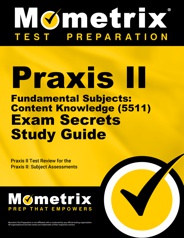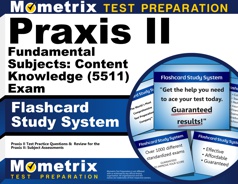The Praxis Fundamental Subjects: Content Knowledge exam is a test used to evaluate the knowledge and skills of prospective entry-level teachers for elementary school.
Click “Start Test” below to take a free Praxis Fundamental Subjects practice test!
Exam Outline
The Praxis Fundamental Subjects: Content Knowledge exam contains 120 selected-response questions and has a time limit of 2 hours.
The exam is split into four content categories, which are designed to cover the various competencies and fundamental points of knowledge that a teacher should possess.
I. English Language Arts (30 questions)
The questions in this category assess the following:
- Reading literature
- Meanings and effects created by specific literary elements
- Reading and communication skills
II. Mathematics (30 questions)
The questions in this category assess the following:
- Number sense
- Basic algebra
- Geometry and measurement
- Data analysis and probability
III. Citizenship and Social Science (30 questions)
The questions in this category assess the following:
- Historical continuity and change
- People, places, and geographic locations
- Civics and government
- Scarcity and economic choice
IV. Science (30 questions)
The questions in this category assess the following:
- Nature and history of science
- Basic principles and fundamentals of science
- Science, technology, and social perspectives
Check Out Mometrix's Praxis Study Guide
Get practice questions, video tutorials, and detailed study lessons
Get Your Study Guide
Registration
To register for the Praxis Fundamental Subjects exam, you will need to create an online account with ETS. Through this account, you can submit an application to take the exam.
During registration, you will be asked to select the test-taking format (remote or at a testing center), test location (if you are taking the test at a testing center), and test date. You will also need to pay the $130 exam fee.
Test Day
In-person Testing
You should plan to arrive at the testing center 30 minutes before the scheduled testing appointment. When you arrive, you will be asked to provide a printed copy of your admission ticket and two forms of valid identification.
You will also be asked to store all personal items, such as your cell phone, wallet, bags, and keys, in a secure locker before entering the testing area.
Once the check-in process is complete and you are fully approved for testing, you will be led to the testing station and given a brief tutorial on the testing system.
Remote Testing
To take the exam remotely, you must use a laptop or desktop computer that has the ETS Secure Test Browser downloaded and installed on it. This is the browser you must use to take the exam. You will also need a functioning webcam, speakers, and a microphone.
When you check in to take the exam, the remote proctor will ask you to show proof of identification and to move your webcam around the room so that your testing area can be observed. Once the proctor has approved your testing area, they will walk you through the testing process and begin your exam.
How the Exam is Scored
Your Praxis Fundamental Subjects exam score is based on the number of questions you answer correctly (your raw score). Your raw score is converted to a scaled score. The scaled score you need to obtain differs slightly depending on which state you take the exam in, but most states require a minimum score of 150.
You should receive an official score report about five weeks after testing.
Check Out Mometrix's Praxis Flashcards
Get complex subjects broken down into easily understandable concepts
Get Your Flashcards
FAQs
How many questions are on the Praxis Fundamental Subjects Content Knowledge exam?
There are 120 selected-response questions on the exam.
How long is the Praxis Fundamental Subjects Content Knowledge exam?
The time limit for the exam is 2 hours.
What is the passing score for the Praxis Fundamental Subjects Content Knowledge exam?
The passing score for the exam will differ depending on which state you take the exam in.
How much does the Praxis Fundamental Subjects Content Knowledge exam cost?
The examination fee is $130.

